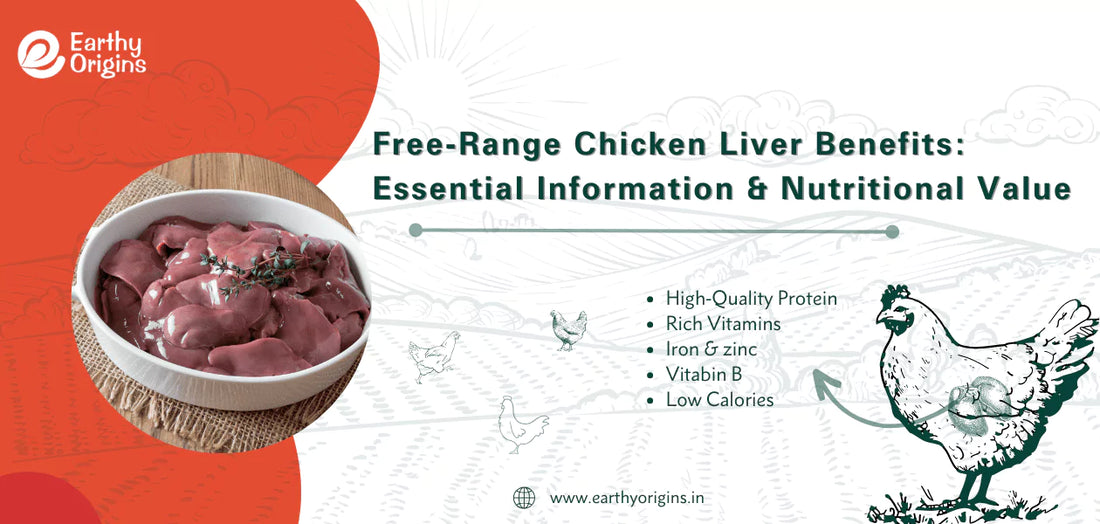Free-range Chicken Liver Benefits: Essential Information and Nutritional Value
Over the past few decades, chicken livers have been one of the most controversial foods. While some have criticised them for having excessive cholesterol levels, others have praised them for having a remarkable array of nutritional benefits.
How can you determine whether eating chicken livers is healthy? Recent studies have shown that this chicken organ meat is nutrient-rich and generally affordable. Chicken livers are more nutrient-dense than the well-known chicken breast! Learn why eating chicken livers is a good idea by reading on.
1. Nutritional Value: Chicken liver is a rich source of important nutrients, such as
* High-quality protein, which is necessary for muscle development, repair, and general health, is abundant in chicken liver.
* Vitamins: It is abundant in many vitamins, including folate (B9), vitamin B9, riboflavin (B2), vitamin B12, and vitamin A. Chicken liver is particularly rich in vitamin A, which is necessary for healthy skin, eyesight, and the immune system.
* Minerals: It supplies important minerals including phosphorus, selenium, zinc, iron. Zinc and selenium are crucial for the immune system and general health, whereas iron is essential for oxygen transport in the blood.
* Healthy Fats: Omega-3 fatty acids, which have anti-inflammatory qualities, are among the few healthy fats in chicken liver.
2. Rich in Vitamin A:
Chicken liver is one of the greatest dietary sources of vitamin A. Vitamin A is vital for maintaining healthy skin, eyesight, and the immune system. It contributes to healthy development and growth as well. A poultry liver contains 5,864 international units of vitamin A, essential for boosting White blood cells (WBC) in our body. It is advised to consume the Liver which has a high level of vitamin A on rare occasions because it can largely hinder your body from adequately absorbing vitamin D.
3. Iron And zinc:
Chicken liver is an excellent heme iron reservoir that the body can effortlessly absorb. Iron is necessary for the prevention of anaemia and the maintenance of energy levels. Iron and zinc are abundant in chicken liver. Iron helps your body produce new red blood cells and utilise oxygen more effectively. A lack of iron can result in exhaustion, decreased oxygen, and a weakened immune system. Every day, healthy males require 8 milligrams of iron, whereas healthy females require 18 milligrams. The iron content in one poultry liver is 5.12 milligrams. Zinc is vital for healing wounds, protective immune system function, and division of cells. Male adults require 11 milligrams of zinc daily, whereas female adults require 8 milligrams. 1.75 milligrammes are found in one poultry liver.
4. Vitabin B:
B vitamins are abundant in chicken liver. One chicken liver has 7.41 micrograms of vitamin B12, which is much higher than the 2.4 milligrams required daily. Vitamin B12 is required for the proper functioning of our brain and nervous system, as well as for replenishment of your blood supplies. A multitude of B vitamins, such as vitamin B12, riboflavin, niacin, and folate are abundant in poultry liver, which are required for the production of energy, proper functioning of the neurons, and the synthesis of red blood cells.
5. Low in Calories:
Regardless of being packed with nutrients, chicken liver is low in calories when compared to other sorts of meat and organ meat. As a result, folks who are controlling their caloric intake might choose this. Interestingly a poultry liver contains 73 calories. While chicken is one of the most popular meats, the liver is often overlooked as an unpalatable section of the chicken's carcass. When pregnant women ingest folate, it helps to prevent infertility and can protect the baby from birth abnormalities.
6. Advantages of Free-Range:
Chickens raised in free-range environments, hunt for their own food and produce free-range chicken liver. As a result, the nutritional profiles of the liver may change slightly from those of conventional poultry liver. The amount of nutrients in a chicken's liver can vary depending on the food, which is frequently more diversified in free-range hens. In addition, some consumers choose free-range goods for ethical and sustainable reasons as well.
Potential Drawbacks: Since poultry liver is rich in cholesterol, those with certain medical conditions, such as hypercholesterolemia, should take it in moderation. Pregnant women should also be cautious about ingesting significant amounts of vitamin A-rich foods.
Finally, free-range chicken liver is a nutrient-dense item that may supplement a healthy diet. It contains important vitamins, minerals, and protein, plus it is derived from hens raised in more natural and humane settings. It should be included in a well-rounded diet, and eaten in moderation like any other food. If you have special dietary issues or health conditions, you should contact a practitioner of medicine or nutritionist before making notable changes to your diet.









